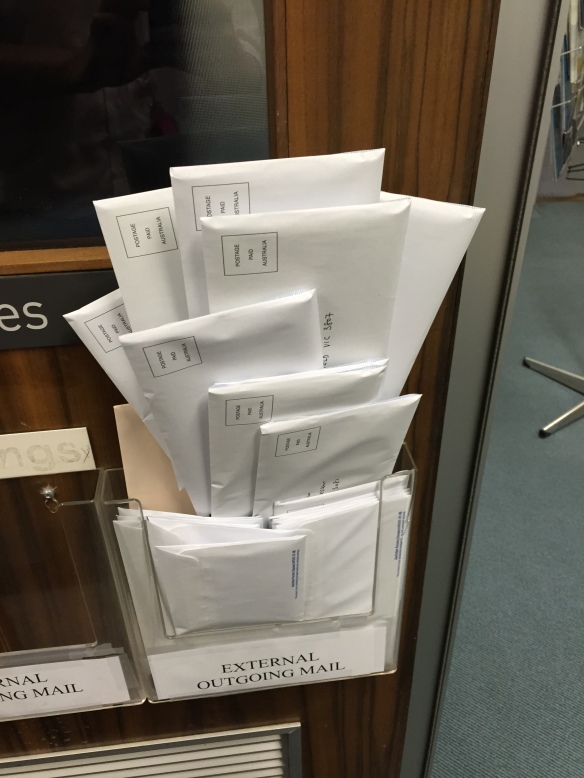Grants and grant writing – the lifeblood and bane of every researcher (and wannabe researcher). What’s all the fuss about? I got my first real taste of it recently when I applied for the Bethlehem Griffiths Research Foundation Research Grant for next year. Here are a few lessons I learnt along the way:
- Grant application is not a linear process: It’s often not about finding the right grant for your idea. Sometimes, it’s about a grant looking for the right idea – hopefully yours! More often, you tailor your idea and apply for multiple grants at the same time. It’s good to be open-minded – as the saying goes, “you’ve got to be in it to win it”!
- Start early: Following on from the point above, ideas and grant opportunities usually do not arise at the same time. So if you have an idea, start working on the proposal straight away – you never know when a suitable grant is going to come around the corner and hit you! Also, it takes longer than you think to put a grant proposal together, particularly when there are multiple investigators involved.
- Build a team: Unfortunately, track record matters. It’s not just about the idea, but whether you can actually deliver it. More on this below. Also, some funders are keen to support early career researchers, others are interested in specific specialties or diseases. If possible, try and include investigators who satisfy these preferences to make your proposal more attractive to the funders! Which leads us to…
- Write for the funders: This requires you to know your funders. A bit of sleuthing will definitely pay dividends: Who are the funders? What are their backgrounds? What are they looking for? Who have they funded in the past? What criteria do they use to assess proposals? Can you get your hand on sample proposals? In addition…
- Write well: Put yourself in the shoes of the reviewers. They are doing this in their spare time and exhausted after reading 15 proposals before yours. They only have 30 minutes to spend on your finely-crafted, impeccably-referenced tome, but will actually only spend 25 minutes on it because they’re keen to get to dinner. So make sure it’s easy to read and well laid-out, proofread with no glaring spelling mistakes or grammatical errors, accessible to the lay audience with no impenetrable jargon, engaging and concise. And…
- Tell a good story: Why should they give you the money, instead of the other 10 applicants? What makes your proposal stand out? It’s primarily about your idea – is it novel and exciting? Does it have real-world implications? Throw in a clinical case or two; entice them with some preliminary data (but not so much that they start thinking: “maybe he’s done the study already”); appeal to the funder’s core values/business. Remember: applications are often screened by the funding board first, before a shortlist is forwarded to the scientific committee for review. So make sure your synopsis – the only thing the board is likely to read – is punchy and begs the question: how can we not fund this? But just as importantly…
- Tell a believable story: While the funders are looking for value-for-money, they’re also looking for reality. Are you trying to squeeze a PhD into a 6-month project and planning to run a multi-site study on a shoestring during your lunch hour? Have you budgeted matching T-shirts for your data analysis team on their scheduled “study retreat” in Bali? Are you proposing to delve into a subspecialty area with no relevant specialists on your research team? Even though many of the reviewers will not be experts in your proposed area of research, at least one will be – so the proposal needs to be scientifically feasible. Plus all of the reviewers will have extensive experience in what a doable project looks like and a finely tuned BS meter.
- Build in dissemination & implementation strategies: In this climate of financial austerity, it’s no longer good enough to conduct research for the sake of generating new knowledge for the glory of humanity and rely on that warm-fuzzy feeling to get your over the line. You also need to demonstrate how the study findings are relevant in the real world. How will you ensure your results and their implications are effectively communicated to the relevant stakeholders, other than on page 1574 of a peer-reviewed journal that only 10 other people will read (with 5 of them being the your co-investigators)? How do you plan to implement your findings clinically, so they translate into improved outcomes? It pays (literally) to address these issues in your proposal. And finally…
- Persevere: Most grant applications are not successful, especially when you’re first starting out as a wannabe researcher. I am totally resigned to the fact that my recent grant application is likely to be unsuccessful. However, it will not be a “failure” or “waste of time” – the process has helped me to think more broadly and deeply about my topic of interest, taught me a bunch of new skills (research and non-research), and given me new insight into “this whole research thing”. And I’m already working on my next grant proposal 😀
Good luck!


Thanks Chi and good luck with your application!
LikeLike